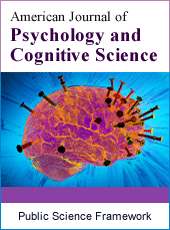American Journal of Psychology and Cognitive Science
Articles Information
American Journal of Psychology and Cognitive Science, Vol.4, No.4, Dec. 2018, Pub. Date: Oct. 25, 2018
The Effectiveness of Parenting Based on Mind-Fullness on Lifestyle and Parental Stress in Mothers with Hyperactive Children in Isfahan
Pages: 57-61 Views: 2360 Downloads: 520
[01]
Neda Mazloom Pour, Department of Counseling, Khomeinishahr Branch, Islamic Azad University, Khomeinishahr, Iran.
[02]
Ahmad Abedi, Department of Counseling, Khomeinishahr Branch, Islamic Azad University, Khomeinishahr, Iran.
The purpose of this study was to determine the effectiveness of parenting based on mind fullness on parenting styles and stress in mothers with high school children in Isfahan. This was done by quasi-experimental method with pre-test and post-test design and two groups were tested and controlled. The statistical population of the present study was mothers with hyperactivity child aged 7 to 12 years old in primary schools in Isfahan, 2017. Of these, 26 mothers who received a higher score in response to the Coners questionnaire (parental form) and willing to volunteer with the researcher, they were selected through purposeful and random sampling. The mothers were randomly divided into two groups: intervention (13 people) and control (13 people). Intervention groups within 8 weeks Mentally-aware parenting education was given. To measure the effectiveness of parenting based on mind fullness on lifestyle and parent's stress, the two groups in pre-test, post-test and follow-up (After one month of completion), parents' stress scales (PSI-SF) and lifestyle (Laali et al., 2012) were performed on them. The results of variance analysis with repeated measures showed that parenting education based on mind fullness had an effect on reducing parental stress and its dimensions, as well as improving lifestyle and its dimensions, and the effect of these trainings continued in the follow-up phase.
Parenting Education Based on Mind Fullness, Parental Stress, Lifestyle, Overactive Child
[01]
Costin, J, Lichle. K, Hill-Smith M. (2004). European guidelines on managing adverse effects of medication for ADHD. Eur Child Adolesc Psy; 20(1):17–37.
[02]
Chang, V. Y., Palesh, O., Caldwell, R., Avants, C, and Margolin, N, (2004). The effects of a mindfulnessbassed stress redction program on stress, mindfulness self-efficacy positive states of mind. Journal of Stress and Health, 20, 141147.
[03]
Chaney, P. T. (2010). Marital conflict and children: an emotional security perspective. New York: The Guilford Press.
[04]
Darini M, Samohammadi B, Davoudi H. (2011). The study of social skills training (SST) on Reduction of anxiety amongst school boys who are afflicted with Attention Deficit Hyperactive Disorder. international congress child & Adolescent psychology; 2593-2595.
[05]
Diener, E. D., Emmons, R., Larsen, R., & Griffin, S. (1985). The Satisfaction with Life Scale. Journal of Personality Assessment, 1, 71-75.
[06]
Diener, E. D., Scollon, C., & Lucas, R. E. (2003) Personality and events: A long urinal Ana-The evolving concept of subjective well–being: lysis. Journal of Personality and Social Psycho-The multifaceted nature of happiness. Advanceslogy, 37, 251-265.
[07]
Dimeff, G. and Linehan, M. (2000). Handbook on parenting: children and parenting. Mahwah NJ: Lawrence Erlbaum Publishers.
[08]
Duncan, L. G. (2007). Assessment of mindful parenting among parents of early adolescents: Development and validation of the interpersonal mindfulness in parenting scale. (Doctoral dissertation). Retrieved from.
[09]
Gupta, V. B. (2007). comparison of parenting stress in different developmental disabilities. journal of Developmental and Physical Disabilities, 19, 417-425.
[10]
Guti. I., Sebro. S., & Lubenko. J. (2012). Child Behaviour and Mother-Child emotional availability in response to parent training program: Moderators of outcome. Procedia-social and behavioral sciences, 5:1418-1424.
[11]
Hall., et. al. (2003). The mindfulness-based stress reduction program: A pilot study monitoring effects with a mixed clinical & nonclinical population.
[12]
Strandova, I. (2006). stress and resilience in families of children with specific learning disabilities. Journal of Revcomplot Education, 17, (2), 35-50.
[13]
Singh, J. (2005). Quality of life & its correlation in patients with substance dependence. Bipolar disorders, 7(2):187-191.
[14]
Sirgy, M. J (2006). The Quality of Life Research Movement: Past, Present and Future. Social Indicators Research, No 76: 343-466.
[15]
Skitch, M and Abela PC. (2008). “I’d rather not talk about it”: Emotion parenting in families of children with an anxiety disorder. J Fam Psychol; 22(6):875.
[16]
Smith T B, Oliver M N, Innocenti M L. (2001). Parenting stress in families of children with disabilities. Ameri Journal of Orthopsychi, 71(2), 257-261.
[17]
Soeini, B, Danlis, A, Mniks, S, Lindaei, E, 2011. The uncivil culture: Communication, identity, and the rise of lifestyle politics. PS: Political Science and Politics, 31 (4): 741-61.

ISSN Print: 2381-7453
ISSN Online: 2381-747X
Current Issue:
Vol. 6, Issue 2, June Submit a Manuscript Join Editorial Board Join Reviewer Team
ISSN Online: 2381-747X
Current Issue:
Vol. 6, Issue 2, June Submit a Manuscript Join Editorial Board Join Reviewer Team
| About This Journal |
| All Issues |
| Open Access |
| Indexing |
| Payment Information |
| Author Guidelines |
| Review Process |
| Publication Ethics |
| Editorial Board |
| Peer Reviewers |


